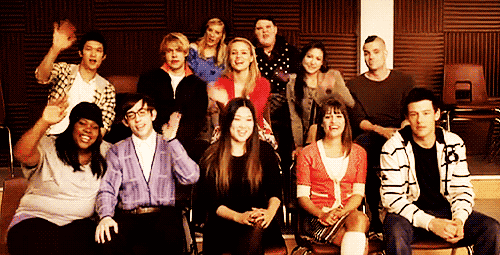'Sometimes you have to call a lesbian spade a lesbian spade. It’s been a damn good week for lesbian and bisexual visibility on TV. Same-sex storylines on Pretty Little Liars and Glee culminated with honest, open, thoughtful discussions about sexuality. And, best yet, they all felt real. In the U.S. we had prominent gay storylines on two popular shows, which resonated with viewers – gay and straight, old and young. All that, and it wasn’t even sweeps month.
On Pretty Little Liars, Paige confessed her unspoken truth to Emily in a scene many of us have seen play out in our own lives – even if only in our heads. It’s the fear so many of us had about coming out that, as she put it, “If I say it out loud, if I say I’m gay — the whole world is gonna change.” Because, in fact, she’s right. Those two little words, “I’m gay,” spoken out loud can change the world. As Emily answers back, “Yeah, it will.” But as she also says, “Whatever else happens, I don’t have to worry about it anymore.”
It felt authentic because it was authentic. You’d think the writers had been reading our high school journals, or perhaps stood in the middle of a bedroom while being honest to themselves for the first time. That sort of open discussion about acceptance and how difficult it can be to come out makes a difference. It also acknowledges not only the external factors that keep us closeted, by the internal ones. This kind of conversation between two teens, one out and one still closeted, is still an extraordinary thing to see on primetime American television.
Just as extraordinary this week was Glee. For a show not known for its deep characterization of adherence to continuity, Glee allowed its gay characters to not only grow but expose their feelings in ways we haven’t seen before. Make no mistake, this is groundbreaking. Two major gay storylines ran through a major American TV show that was watched by almost 12 million viewers.
The first, more expected, storyline was Kurt and his father. The relationship between these two has been one of the continual bright spots on this show. It’s almost always pitch perfect and the best way of showing – and not just telling – parents everywhere how to relate to their gay children.
Try to think of the last time you saw “The Sex Talk” between parent and child handled in such a loving, relatable way. It wasn’t about just the jokey uncomfortableness that often permeates such scenes, but the real message that sex should be special. I’ve never seen a parent tell a gay child that he should respect himself and his body in such a direct way on primetime U.S. television – ever.
The second and more surprising of the gay storylines on Glee was that of Brittany and Santana. The Cheerio best friends had been a bit of an in-joke for two seasons. It started in the first season’s fall finale episode “Sectionals” when in a conference call we got the casual bombshell that “sex is not dating,” because otherwise Brittany and Santana would be dating. Since then the duo’s friends-with-benefits relationship has been eluded to, even teased with some sweet lady kisses and cuddle time in bed. But would they ever become more?
When Glee co-creator and writer Brad Falchuk tweeted confirmation that “Brittana was on,” a mix of excitement and skepticism spread among fans of the show. Was this real life? Was it another tease?
Well it wasn’t a tease. And it was more than most of us even hoped for. This wasn’t about titillation. There was no hot girl-on-girl action. It was just about feelings, real ones, the ones we’ve all felt when we were finally brave enough to give our naked, fragile heart to another person. The experience of falling in love with your best friend is a nearly universal one for gay teens, and even many adults. The heartbreak when they don’t love us back, or perhaps just aren’t ready to love us back, is just as potent. That second “please” from Santana to Brittany, came from the deepest past of her heart: “Please say you love me back. Please.”
What Glee also did expertly was address the fluidity of sexuality between Santana and Brittany. Santana’s resistance to labels – and Indigo Girls concerts – and Brittany’s love for both Artie and Santana represents a spectrum of what it means to be gay. If there’s another line that will stay with me for a long time, it’s a shocked and spurned Santana crying, “He’s just a stupid boy.” Oh, honey, we’ve all been there.
As an underrepresented minority group in this world, we gays have become hyper vigilant to our representation in the media. We see ourselves so infrequently, and often so inaccurately, we need to police what is being put out there. It matters how we’re shown on TV shows because that might be someone, somewhere’s only exposure to a gay person. (Side note: It’s not. We’re everywhere, darling.) So groups like GLAAD and this site have a responsibility to lay a righteous smackdown when we feel we’re being portrayed unfairly.
But just as important as calling out the media when it gets things wrong, is praising them when they get things right. It’s that old carrot and stick. And this week, on primetime U.S. television, Hollywood got things very, very right. We had a good week, let’s hope for many more to come.'
source: AfterEllen
Celebrating an extraordinary week of TV for lesbian visibility
Tags article, episode 2x15, general
Subscribe to:
Post Comments (Atom)

credits: tumblr



























0 commenti:
Post a Comment